Written by Efrat Fenigson for Bereshit Newspaper | Translated by Deborah Garber
The film “Planet Lockdown” was released at the end of 2020, and within several weeks it reached 20 million views on YouTube before it was censored. The film includes interviews of some of the world’s biggest experts in their fields. Catherine Austin Fitts, an American investment banker and assistant to the minister of housing during the George Bush presidency, is one of these experts. She explains how the aim of the Covid crisis (and the way in which it was managed all over the world) was actually to force the New World Order that had been brewed by globalist organisations for quite some time, upon the world. The time was ripe, in her words, and Covid 19 enabled the forcing of laws, regulations and psychological operations, causing people to submit to a world of lockdowns, limitations and control in every facet of their lives.
Fitts joins the dots and shows how supposedly separate systems of health, media, army, technology, money, and economics, are in fact interrelated, and how the changes that have been occurring in them over the last few years have been designed very cleverly to divert our attention from blaming the true villains for the monetary crisis. She reveals their wily covert methods, planned over the long term, seemingly unconnected, leading average people relatively easily straight into the trap.
After three years of being manipulated, a clearer picture is emerging and proving that Covid 19 served as fertile ground for speeding up and pushing forward means of surveillance and high-handed rule by government both in Israel and the rest of the world. Now it is easier for us to see those traps that are ensnaring us both physically and mentally. One of those control methods gaining speed in the last two years is the “smart cities” or in the catchy marketing jargon “15-minute cities”. On its face, the aim of such cities is to enable the inhabitants to enjoy services and fulfill all their needs close to home. To incorporate services, trade, social and cultural life in every neighbourhood, and create one environment that contains all (or most) of the what the inhabitants need, whilst using cars much less, and even banning them completely, promotion of cycling and walking, together with public transport. The declared aim: reduction of CO2 and air pollution. The result: evacuation and rebuilding of whole neighbourhoods, accessed by cars in the past, in favour of pedestrians and bicycle riders. In reality: Great difficulty getting around urban areas under constant building projects and crowdedness, policing, and heightened surveillance of civilian behaviour, and as always, an added burden of taxation on the taxpayer whose only desire is to get on with life. Those in favour will praise progress, future comfort, and the inevitable necessity of adaptation of modern life to high density living. The nay-sayers will see in such projects a physical and mental modern jail.
The declared aim: reduction of CO2 and air pollution. The result: evacuation and rebuilding of whole neighbourhoods, accessed by cars in the past, in favour of pedestrians and bicycle riders. In reality: Great difficulty getting around urban areas under constant building projects and crowdedness, policing, and heightened surveillance of civilian behaviour, and as always, an added burden of taxation on the taxpayer whose only desire is to get on with life.
Tel Aviv: surveillance and fines
In Tel Aviv for instance, they are calling it a “New Transportation Order” (since “New World Order” was already taken). This is how it was advertised in a pamphlet of the TA municipality last month. This order turns the transportation pyramid on its head, and presents a new order of priorities in the public space, in which the private vehicle is the last on the list.
Tel Aviv residents and visitors have come to understand in recent years that it is exceedingly difficult to travel in the city without being caught by the ubiquitous lenses of the automated cameras recording their every move on the roads or when parking in restricted areas, thus making the inevitable fines unavoidable.
Moreover, the police network named “Hawk’s Eye”, in existence since 2015, decodes license plates and surveils traffic on the roads. “Hawk’s Eye” was not intended as a traffic offense detection system, but rather as a surveillance and intelligence system created to cross reference vehicle details with police records to help the police locate serious criminals or even far less serious offenders. The network, as it stands, is open to abuse and can be used by the police to invade the privacy of civilians without the need of a court order. This vast information reserve has not yet been regulated by law, and no restrictive or oversight measures have been applied to the police, which enjoys immunity from the laws of FOI (freedom of information) as far as this system is concerned. Cameras in every corner have become a common scene in the public space.
Under the cover of smart cities, everything is monitored and recorded; In TA the public is caught on more than 2000 cameras, in Jerusalem 1000, in Rishon LeZion more than 1,500. They would have us believe that it is all in the name of our safety and wellbeing, but who is protecting our privacy? Who is ensuring that all the information being gathered will not serve to incriminate us or be used as evidence against us by the authorities? We have already seen how the secret service was able to access our phone locations during Covid, owing to the Emergency Powers legislation, and no legal system was there to protect our rights.
Eilat: one of a hundred cities fighting climate change
Eilat was selected by the European Union as one of 100 cities to turn smart and clear of CO2 emissions. “The city of Eilat that has been working towards smart city status for a decade, has been selected by the Horizon Europe program of the European Union to be one of 100 cities to turn smart and zero carbon”, it was stated on the Eilat website. “Eilat produces 100% of electricity consumed during the day from solar energy and promotes many related projects, is the only city in Israel to be included in the program”, so it continued, “the program fully funded by the EU has been allotted 360 million euro as the first step for 2022-23, through which cities will serve as technological hot houses in the application of pilot programs in this field, and will serve as a model for the whole of Europe and the world in the fields of energy, transport, building and refuse. 377 cities in the world responded to the public appeal put out by the EU in November 21, to turning 100 cities in Europe and partner countries into zero carbon smart cities by 2030.”
Side by side with positive initiatives of recycling and protection of beaches, one can find Project Leonardo promoting traffic efficiency in the city whose aim is to analyse inhabitants’ travel patterns while installing electric scooters across the city and learning about users’ needs. In other words, there too, they are surveiling us.
“It will be hard to prevent non-electric cars entering the perimeter of Eilat”, said the mayor Eli Lankri last year. “In any event, we will do all that we can to reach the goal of carbon neutrality on time, and the framework of the new initiative will undoubtedly take us very far forward.”
London: A Tax Grab
The town of Brentwood in the county of Essex has recently placed new signage in the streets bearing the acronym ULEZ – Ultra Low Emission Zone. ULEZ currently covers inner London and non-compliant vehicles must pay £12.50 a day to drive within the North and South circulars. The signage in Brentwood is a result of the expansion of the ULEZ to greater London, with the aim of reducing emissions of CO2 and air pollution.
Expansion of the area from August 2023 will encompass 5 million people, 200,000 of them owning non-compliant vehicles. They are generally pre-2005 petrol cars and pre- September 2015 diesel vehicles. The Brentwood committee proposed a motion to oppose the expansion and announced that it would not cooperate with the policy. "This proposal will impact many residential drivers and small businesses who cannot afford to upgrade their vehicles in the timeline planned by the mayor of London. "We all want to see air quality improve over time and the government has already set ambitious targets to switch to electric cars over the coming years (up to 2030)”, said councillor Keith Barber who proposed the motion. "This is truly a "sledgehammer to crack a nut" that will have perverse outcomes for many Brentwood residents" he added.
Since the outbreak of Covid-19, Freedom of Information requests are one of the only tools left for citizens to protect their rights in Israel and abroad. These requests help to expose more and more cases of injustice and wrongdoing. In London, too, new documents obtained under Freedom of Information laws reveal how Traffic for London (TfL) began ordering hundreds of number-plate-reading cameras required for the scheme in April 2022 – a month before the public had been asked to have their say. This paper understands the order was worth up to £15 million. Transport for London (TfL) asked the public if they backed the plan in May 2022 during a ten-week consultation. Then in November, Labour’s Mr Khan said he was pressing ahead with the scheme – despite 59 per cent opposing it. A new legal challenge may be brought against the London municipality owing to this information.
There have been huge turnouts at the ULEZ protests at Trafalgar Square in London over the last few weeks. The residents report that numbers of angry protestors grow with every protest as their lives are being negatively impacted by ridiculous, unjustified traffic reduction restrictions across London and England.
Bath: Low Traffic Neighbourhoods
In the picturesque city of Bath, as in many other towns and cities like Oxford, new Low Traffic Neighbourhoods (LTN) were launched early this year. The local council intends to create more such neighbourhoods. It has created 15 of them and is planning an expansion to 48 neighbourhoods soon. Barricades, poles, and closed-circuit cameras will be used to enforce these LTNs to restrict the traffic across the cities causing longer travel times to work, school or hospitals, which in turn brings about heavy traffic and frustration. The council has refused to listen to the disabled who will be disadvantaged by these restrictions. They want to increase pedestrian traffic and bike riding, but do not consider the fact that not everybody is able to comply – especially the disabled, the elderly, parents with young children or craftsmen carrying equipment. The citizens worry that many of Bath’s roads will be blocked, parking spaces will be removed or limited, and customers attempting to access local businesses such as shops, pubs and restaurants will have nowhere to park. These severe restrictions will have a hugely detrimental effect on the workplace and economy of Bath.
Birmingham: Clean air or clear profit?
In June 2021 the city of Birmingham launched project Clear Air Zone (CAZ).
The city council stands to make £50 million from this zone by the end of 2023, again, under the cover story of reduction of CO2 around the city centre. Around 50,000 drivers are fined each month under the CAZ framework, because they either ignore or do not understand how the project works. Non-compliant car owners must pay £8 per day to drive in the CAZ, and drivers who fail to pay the license land a £120 fine. These are clear traffic reduction and deterrence tactics. In reality, the council is finding it hard to enforce fines, and thousands of inhabitants are refusing to pay. Only about 40% of fines are paid within a month of receiving them. Recently it was announced that the council cancelled 50,000 fines because of opposition by the locals, and another 20,000 were cancelled because the addressees were not found. Even though these numbers represent only 6% of the fines, the power of resistance is evident.
Oxford: 15 Minutes on steroids
Oxford is going full steam ahead on the project that will turn it into a “15-minute city”. Here too, LTNs are popping up, as well as number plate reading cameras. As part of the program, the city is divided into different neighbourhoods and people living in one neighbourhood will be fined if caught travelling to another. A council representative told a local newspaper that the council had decided to give the green light to these traffic filtering methods, including banning private vehicle travel at certain times. Although no physical barriers will be erected, there will be “behavioural” barriers such as monitoring of cars by number plate reading cameras, and the issuing of fines. Moreover, the locals will be able to travel in their private vehicles no more than 100 days a year in these LTNs.
Thousands of people came out to protest the Oxford restrictions in recent weeks thus raising public awareness of the issue and expressing their objection to the plan and the many restrictions.
And Oxford is not alone. Paris, Melbourne, Cleveland (Ohio) and others – have announced the plan to become smart, 15-minute cities. Tel Aviv, too, has joined the initiative, but decided to avoid the globalist term “15-minute city”, one wonders why – possibly fear of objection by the residents.
The "congestion fee" - a laundered name for tax payment upon entry to Tel Aviv - was indeed approved by the government last year, but it is being handed from one government to the next like a hot potato, to be implemented when the opportune time arrives. Other cities in Israel such as Bat Yam, Petah Tikva, Ramat Gan, have started the division into regions or districts, in a similar pattern to the cities covered in this article. In stage one in Israel, we see services being made accessible to the residents in areas close to home, a positive thing on the face of it, but we will not be surprised to see the application of fines, restrictions, and fees down the road, just as we see in England.
Saudi Arabia: first place in innovation and the realization of Vision 2030
A right marker in the field of smart urbanism and 15-minute cities is Saudi Arabia, which has launched multiple initiatives and huge projects under the C4IR, the Centre for the Fourth Industrial Revolution of the World Economic Forum, the WEF. Among these mega-projects you can find the futuristic city of Neom, and the 15-minute city of New Murabaha within the capital city of Riyadh. The ultimate goal of these projects is to make Saudi Arabia a world leader in the field of tourism, technology and creative industries, according to the "Saudi Vision 2030".

Saudi Arabia's vision aims to diversify the country's economy and add sustainable projects and cities to the portfolio, which currently depends mainly on oil, with 80% of revenue from exports. It is estimated that the smart city projects will add about 180 billion dollars to the non-oil GDP in Saudi Arabia.
The Saudis enter the 15-minute game, thinking precisely inside the box in New Murabaha, which boasts a recreation area, entertainment, hotels, and a mall in the shape of a huge cube 400 meters in height and width. The project will use advanced technologies including holograms and virtual simulations to produce an extraordinary fantasy experience. The shopping centre will include green areas and walking and cycling paths, "to promote a healthy and active lifestyle and community activities". A promotional video for the complex shows that everything within the city will be accessible within a 15-minute walk. Surrounded by the cube structure, the internal spiral will display realistic images of the building; spaceships fly above, huge mountain ranges and towering waterfalls, all set against a desert backdrop, the grandiose utopian project of New Murarabha is expected to be completed by 2030.
Another smart city called Neom is planned in north-western Saudi Arabia; It was announced by the Crown Prince in October 2017, also as part of the Saudi Vision 2030 to reduce dependence on oil, diversify the economy and build public service sectors. The most ambitious, craziest project in Neom is the vertical city project called "The Line".
Out of a science fiction world, to the average person the line looks like a structure from the movie "The Matrix" at best, or an episode of "Snowpiercer" on Netflix, at worst. There is no arguing, that it is not average. Here, too, using utterly utopian marketing, the visual website describes the dream called Neom: "Without roads, cars or emissions, the city will run on 100% renewable energy and 95% of the land will be dedicated to nature conservation." The health and well-being of the residents will be prioritised ahead of transportation and infrastructure, unlike traditional cities. It will be only 200 meters wide, but 170 kilometres in length and rise to 500 meters above sea level.'
"The Line" project will eventually accommodate 9 million people on a footprint of only 34 square kilometres (!). This will mean a reduced infrastructural footprint and an efficiency that has not yet been seen in urban functioning. The ideal climate throughout the year will ensure that residents can enjoy the surrounding nature, and naturally, there will have access to all facilities within a five-minute walking distance, in addition to the high-speed train - which guarantees a transition from one end to the other in 20 minutes. The ambitious project will be powered exclusively by wind and solar energy and its cost is estimated at approximately 500 billion dollars. According to Amnesty International (AI), the Saudi Vision 2030 is made possible by a large-scale demolition and evacuation program affecting half a million people in the area, in violation of international human rights standards and discriminating against foreign nationals. Surprising? Not to us, but you know, they'll get to zero emissions, and boost the Saudi economy and wealth.
And as usual, human and civil rights are violated
The concern for the earth and the climate and the intention to protect the earth and minimize climate damage, are fundamentally welcome and correct. The ecosystem we are a part of does require attention and respect, and initiatives in this area are very important. The concept of neighbourhoods where everything is accessible and within walking or cycling distance is also a good idea. The problem is not with these ideas and perceptions. The problem begins when, in the implementation of these ideas, attention is not given and no thought is given to populations that may be harmed, and worse, these ideas are disseminated in the public under the guise of improving our quality of life and saving the planet, when in practice they limit us and our freedoms, to the point that we cannot move from place to place freely, or at all.
If the intention is to help the earth reduce damage and minimize air pollution and carbon emissions, it is appropriate to tackle this problem with those most responsible for the greatest pollution, i.e., the corporations and governments, and not to blame everything on the average citizen, the elderly, the disabled, parents of young children, people who cannot afford electric vehicles and others. If these ventures are motivated by pure and good intentions, why aren't parallel initiatives created with the same speed and urgency to prevent factories, corporations, and governments from polluting the environment - destroying oceans, harming forests, vegetation and animals? And why are they accompanied by so many policing, tracking, monitoring and surveillance procedures?
We are all in favour of improving quality of life and environment, and strengthening the community. But at whose expense?
Want to support my work?
Since I’m based in Israel and SubStack doesn’t have a payment service for Israel,
you can “buy me a coffee” to support me.
Thank you!



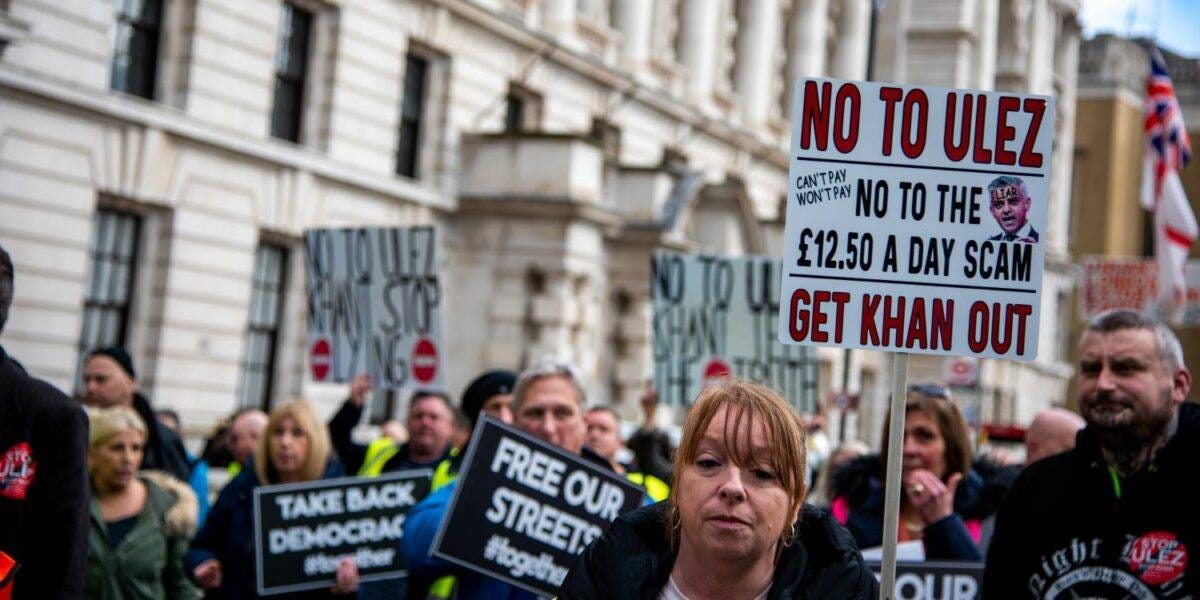

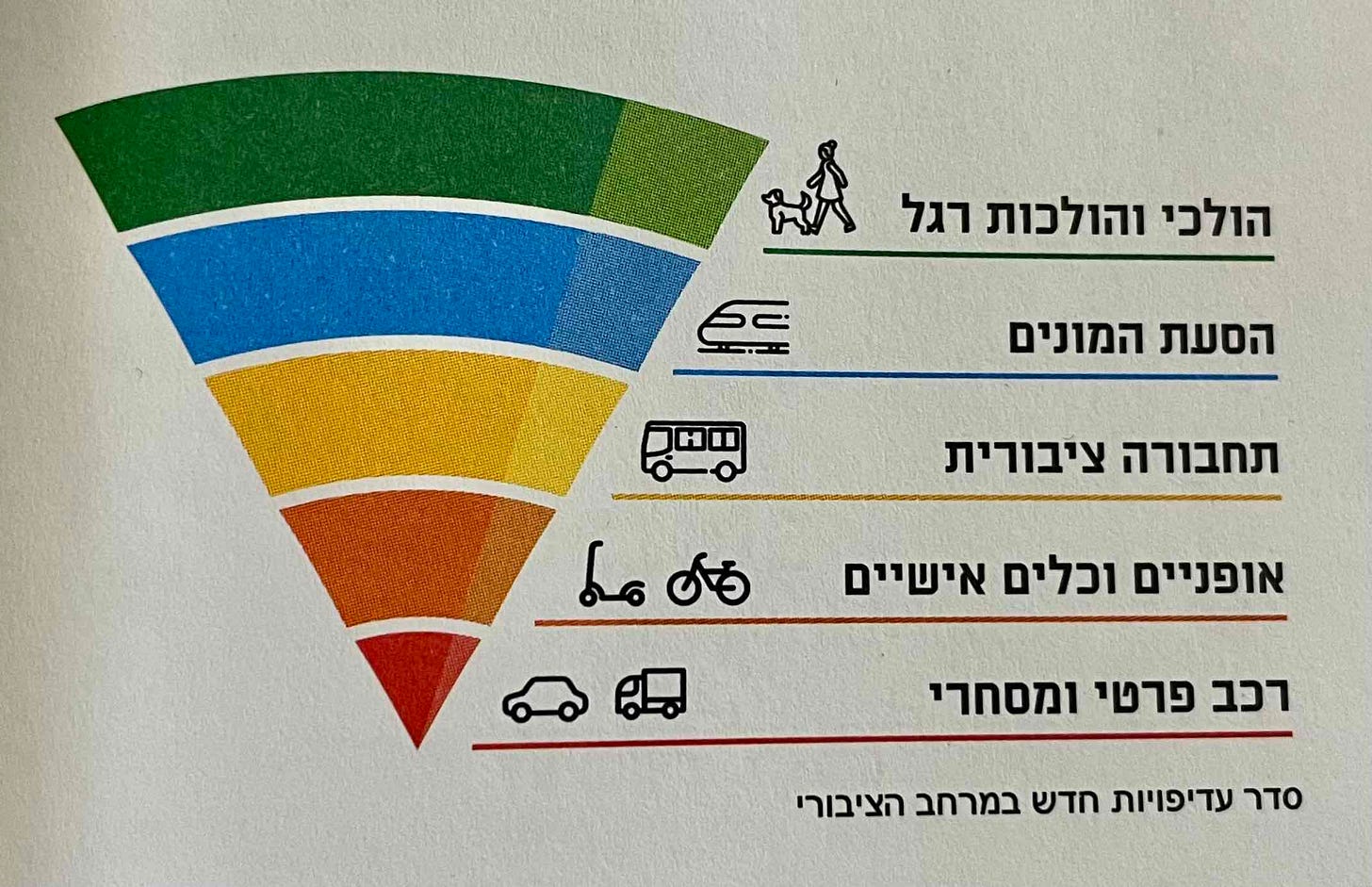
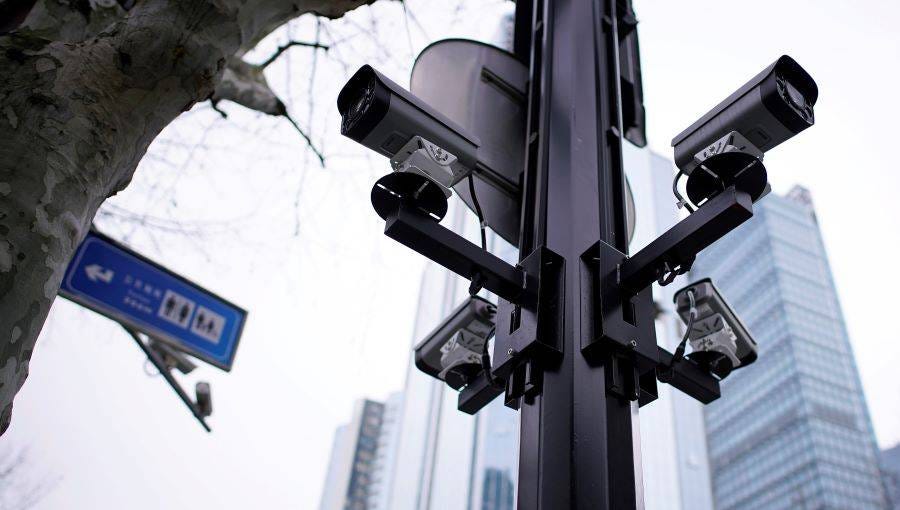


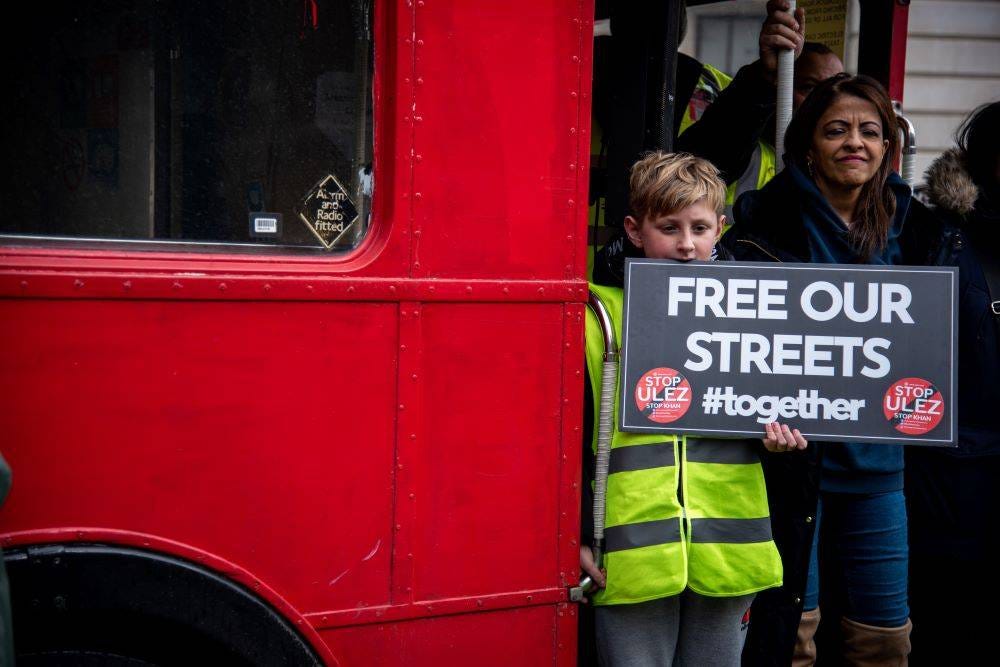




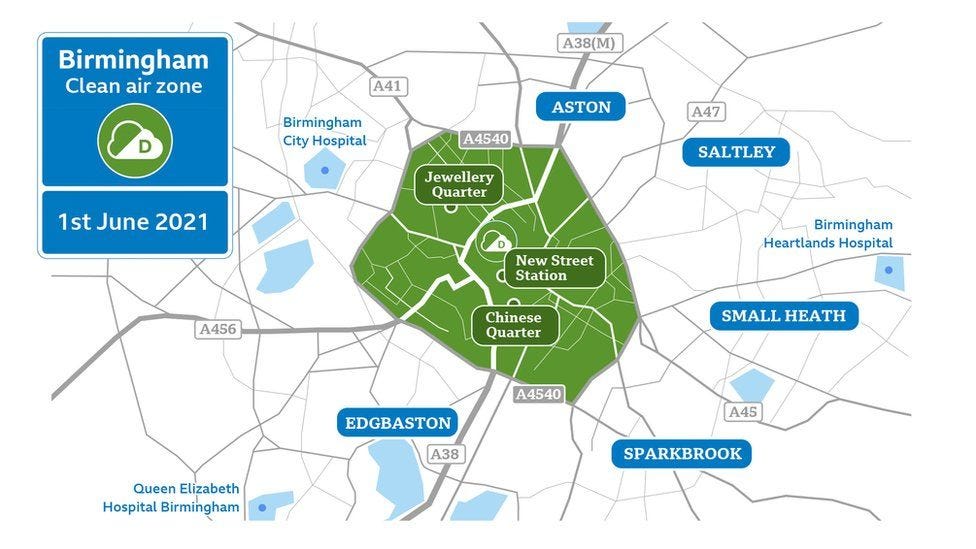



Hi dear “Imagine Piece”, you put it so precisely... some people have no conscience in my opinion, how convenient they can “upload it to the cloud” and forget about it.
It is indeed a battle on our souls. Who would have imagined this is where we’ll be in the 2020’s...
Thanks for commenting and sharing, and of course for watching my interview with Rafi - which has now been banned off YouTube!! We spoke to much of the forbidden language for the thoughts police I guess.
Take care and thanks again for your support.
Efrat
Excellent read, Ty.